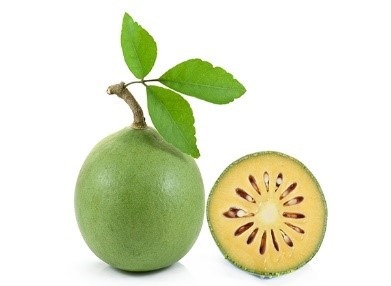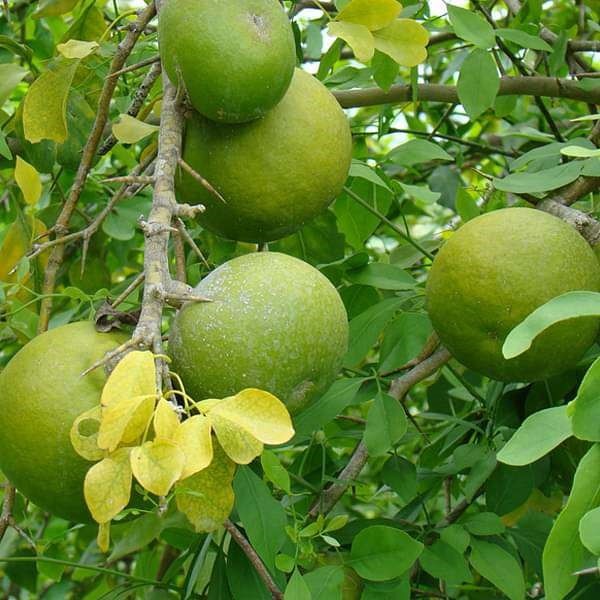Bilva
Indian Bael / Stone apple / Wood apple
Aegle marmelos
Bilva tree is native to India and found widely in Asia, Sri Lanka, Pakistan, Bangladesh, Thailand, etc. It is sweet in taste and cool in nature. The pulp of unripe or half-ripe fruits is the most used part apart from its roots and leaves.
बिल्वस्य च फलं स्निग्धं साङ्ग्राहि दीपनीम्॥


Bilva is a sacred tree to Hindus since Vedic time and has been extensively described in vedic literature. The leaves are called as ‘Tri-patra’ and commonly known as ‘Shiva-dhruma’ as it is favourite of Lord Shiva and they are offered to him on occasion of ‘Mahashivaratri-Shiva-pooja’. Also, Bilva tree is usually seen near these temples. According to Skanda-puran, Bilva is considered as one among kalpa vruksha that emerged during ksheerasagara-manthana. Padma-puran has records of Bilva leaves offered to Lord Shiva. Uses of this plant is also recorded in Indian Classics like Yajurveda and Mahabharata.
Bilva plant acts as a ‘Purifier’ for the atmosphere as it absorbs chemical pollutants, poisonous gases, etc. and makes them inert or neutral. It is a member of plant species group known as ‘Climate Purifiers’, which emit a greater percentage of oxygen in sunlight as compared to other plants. In Sanskrit, Bilva is also known as Shiveshta, Sadaphal, Trishakha, Kapitha, Putivaha, Maha-Kapitha, etc.
Health Benefits from Bilva:
Ayurveda texts describe Bilva as kapha and pitta-ghna (it pacifies kapha and pitta doshas) which helps to maintain digestive health. Combining the sweet, cool, appetizing and digestive properties with its rejuvenative action, Bilva brings a host of benefits to the rest of the body apart from the tummy.
- Bilva significantly enhances the strength of digestion and other metabolic activities.
- It is an excellent herb for problems related to the gastro-intestinal tract.
- It is effective in conditions such as Irritable Bowels Syndrome (IBS), ulcerative colitis, acute or chronic dysentery, diarrhoea & associated abdominal discomfort like bloating or flatulence.
- In ulcerative colitis it reduces vomiting, stomach cramp, pain, etc.
- Bilva is immune-modulator in nature.
- As Bilva has astringent properties, beneficial in various bleeding disorders too.
- Bilva root tastes sweet, balances Tridosha- vata, pitta and kapha; possesses anti-inflammatory and anti-emetic properties.
Bilva for Gut Health:
Raw fruits of Bilva acts as an appetite-stimulant, digestive-stimulant and intestinal motility regulator. It corrects loss of appetite or anorexia, diarrhea, colic and all related gastrointestinal problems. It is oleating (snigdha), so coats the intestinal lumen. It also inhibits the bacterial colonization and acts against certain toxins that may be released by them. It also has a protective effect on the stomach lining.
Bilva for IBS:
Bilva is an excellent herb that helps in forming proper consistency of stools (grahi i.e. maintains consistency of stools). Also, it helps in digestion of undigested food and dries up the excess liquid inside the faecal matter. Being astringent in taste it contracts the strotas (channels). This results in forming of stools with proper consistency, with no excess secretions and the intestines hold stools as they should.
Bilva for Piles:
Bilva promotes healthy gut function and improves the process of digestion and excretion. This in turn helps to prevent anorectal disorders like piles, fistula, fissure, etc. Also, decoction of Bilva helps reduce pain and bleeding during evacuation in piles.
How to Use Bilva:
- Its leaf juice is useful in treating conjunctivitis.
- You can mix Bilva root decoction with honey and consumed to provide relief from nausea and vomiting.
- In oedema or inflammation, you can give its leaf juice with black pepper powder. This also helps to relieve piles and jaundice.
- To provide relief from vomiting and dysentery in kids, its root decoction is given with roasted puffed rice (laja) and sugar
Sandu formulations containing Bliva:
Bilagyl: is a proprietary Ayurvedic formulation to address gastro-intestinal complaints especially Irritable Bowel Syndrome and Ulcerative colitis.
Osteon-D: is a proprietary Ayurvedic formulation beneficial in post-menopausal osteoporosis, pre-menstrual syndrome, osteoporosis, healing of fracture, pregnancy, lactation, growth phase of children.
Sandu Dashmoolarishta: is a hydro-alcoholic Ayurvedic formulation beneficial in various vata dominant disorders, cough & cold, post-delivery recovery, menstrual complaints, loss of appetite, etc.
Sandu Dashmool Kadha: is a proprietary Ayurvedic formulation beneficial in painful menses, post-delivery period, oedema, body ache, musculo-skeletal disorders like arthritis, etc.
Sandu Balant Kadha No.2: is a proprietary Ayurvedic formulation especially for new mothers to be taken from 11th Day post-delivery.
Sandu Balant Kadha No.3: is a proprietary Ayurvedic formulation especially for new mothers taken from 21st Day post-delivery.
Sandu Patrangasav: is a hydro-alcoholic Ayurvedic formulation used in various menstrual complaints like disturbed or irregular bleeding, leucorrhoea etc.
Elegance Oil: is a proprietary Ayurvedic formula for beautiful skin. It helps in nourishment and development of infant, especially premature and underweight new born; development, nourishment and toning of muscles and ligaments. It improves circulation, metabolism and immunity.
Citations:
- Chamila Kumari Pathirana, Terrence Madhujith, Janakie Eeswara, “Bael (Aegle marmelos L. Corrêa), a Medicinal Tree with Immense Economic Potentials”, Advances in Agriculture, vol. 2020, Article ID 8814018, 13 pages, 2020. https://doi.org/10.1155/2020/8814018
- Mazumder, R., et al. “Antidiarrhoeal evaluation of Aegle marmelos (Correa) Linn. Root extract.” Phytotherapy Research: An International Journal Devoted to Pharmacological and Toxicological Evaluation of Natural Product Derivatives 20.1 (2006): 82-84
- Dhuley JN. Investigation on the gastroprotective and antidiarrhoeal properties of Aegle marmelos unripe fruit extract. Hindustan Antibiotics Bulletin. 2003 Feb-2004 Nov; 45-46 (1-4):
- 41-46.
- Joshi, P. V., R. H. Patil and V. L. Maheshwari. “In vitro antidiarrhoeal activity and toxicity profile of Aegle marmelos Correa ex Roxb. Dried fruit pulp.” (2009).


